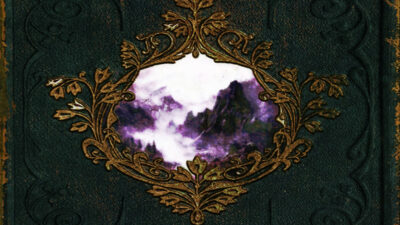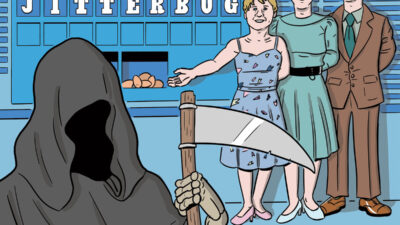The autumn when I realized my parents were divorcing, I noticed my father become a recursion. He’d been sinking into it for a while, but suddenly I found him trapped in amber, asking me the same questions over and over. He wanted me to remember everything. He’d bring up all these slight instances he’d become hung up on, people putting hurt upon him, the harmonious times he had shared with me before then, all these strands of memory rehashed in fine-grained detail that were the only thing he wanted to have together instead of even the slightest possession to be here now. He was a ghost stuck somewhere between born-again Christian and hollow trauma shell.
I made a silent promise to myself to hope that I’d one day end up nothing like him—on some scale, I ended up there naturally, but the want to tell stories still boiled up from the innermost caverns of my being. The day I felt I had properly distinguished myself from him, I was staying at his house for an overnight. A few weeks earlier I’d come out to myself as a woman, a fact he wouldn’t know for another six months that had become a little secret I’d invisibly wadded up in the corner of the guest room he’d tried his best to lay out for me. I crept into the guest bathroom at 7 a.m. knowing I had a few hours to unwind my task while he was still on the overnight shift at the manufacturing plant that employed both my parents.
I began work, or a ritual, or something pacing between the two. I took slow, precise cuts up my thigh while crouched at odd angles all over the shower, trying my best with one of those shitty disposable cartridge razors to scrape away years of built up tangles demarcating the gendered installation of refusal to manicure. It took me four of those mornings contorting myself in there, choked up on the mix of steamy stale air and lingering marijuana fumes that weren’t mine, until finally, I was clean. As molehill-to-mountainesque as it was, I felt free from this small bit of display that tethered me to the expectations of masculinity, the first small distinguishment I could make in my physical form that might set me apart. Still, I remembered things just like him.
—
Wednesday are a band whose strengths lie in their ability to conjure minutiae, by the means of the wail of an amped up pedal steel or a cutting aside like “my dad picked a Dallas Cowboys urn to put your ashes in.” Their two mainline releases up to this point, 2020’s I WAS TRYING TO DESCRIBE YOU TO SOMEONE and 2021’s TWIN PLAGUES, are subtle records, harnessing the knotted textures of shoegaze to play at the hushed temperament of classic country music. Frontwoman Karly Hartzman’s lyricism has remained the primary selling point for the group, with a writerly focus on slice-of-life imagery of youth in Southern suburbia.
To fully unravel the psychic entanglement I found myself snared in when finally sitting with this band’s lyrics is to step out and try to read you my exact carbon dating and the biographies soaked into its core material. To put it in more sitcom-ish linguistics: “They just get it.” I’ve always been more infatuated with artists who willingly engaged in the understanding of Southern culture as it truly is, be it Wednesday, or my beloved ‘90s R.E.M. or my most recent venture, country music of all eras, or frankly any number of entrenched infatuations I’d had in the years preceding.
It is work that places itself in the locales of one’s heart, the images that get roped into my dreams repeatedly, of the low permeation of a cargo train passing through the dim canopies ensconcing swamp-like forest, of the sight of spotting a kudzu valley as a child and wondering briefly if there was a whole city beneath it. To break this connection down is to take apart these lyrics piece by piece and give you the same over detailed recapturing of a story in the manner Karly, and frankly every Southern songwriter, does. Even looking at the humblest big-names-only view of the indie rock canon down here, we can see bands coming to, at one point or another, the same dogged question of trying to explicate how memory works. These exemplary works, such as AUTOMATIC FOR THE PEOPLE, HALCYON DIGEST, and centrally Wednesday’s latest, RAT SAW GOD, make the step further to properly interrogate this question and give it the context of the past’s intrusions upon the present. To have lived here is to understand the manners in which history keeps people obsessed with itself, and how generational trauma and a need of either escape or contentment take form within you as you develop.
—
When growing up down here, even if you don’t experience the exact particularities that coming of age in this particular moment in the South brings, you accumulate a good number of stories in your life to carry with you—many of them not your own. So much of the fabric of Hartzman’s work as a songwriter lies in an artform similar to the one she works in outside of music: That of collage and homemade fashion items, stitching together disparate pieces which might evoke the same feeling as one another until they’re able to contort into the greater statement one might want to conjure. Take, for example, their third single “Bath County,” which pieces in twists on lyrics from Loudon Wainwright III’s “I Am the Way” with observational storytelling of a rowdy trip out to Dollywood and the sight of death in a Planet Fitness parking lot, bringing the components together to make a tune that contrasts the violent randomness of reality with scenes of rebellion in youth.
So many of the tales on RAT SAW GOD have a particular vibrancy of chaos that one can relate to, the sort of latched onto details that stick in your head when you replay anything enough, like my own recollections of kids downing Four Lokos in an abandoned storefront or afternoons spent laid out watching little cars go by on the Blue Ridge parkway, which have attained their own granularity through remembrance. It is art-as-exorcism to the spectral qualities of memory, a show of vulnerability in the hopes of making something that someone else may find real connection to.
In that sense, RAT SAW GOD lands as a near perfect work for me both on a plain musical level, but more importantly, as the kind of distinct and relatably Southern work that indie rock so rarely gets at the forefront of. Wednesday have hammered together their equivalent of a “blank check” film in an auteur director’s catalog: A bigger, unwieldy thing that makes brilliant decisions hand in hand with a few out right baffling ones (“Bull Believer” as the second track is a choice that, without the context of the album, seemed a bit odd, but in full place at its normal sequencing leaves the very end of the record feeling a bit lopsided compared to the other portions), while still maintaining the specificity of vision that draws listeners into their discography in the first place.
Wednesday remain texturalists first and foremost, using their particular blend of garrotted-sounding electric guitar tones or the whine of a pedal steel that can seemingly conjure specters. Here, they finally take a step beyond the gentle evolution that happened between DESCRIBE and PLAGUES, with the band allowing themselves the luxury of moving towards more immediate choices, letting nearly every song have its own solid chorus and unique rhythmic drive. Take any track from the previous LPs against a highlight like the bassy stomp of “Got Shocked” and it’s apparent the band have found a momentous level-up in confidence of their abilities in arrangement. They show again that the bounds of their self described “countrygaze” fusion has so many more boundaries to poke at for new ground, from borrowing modern indie rock’s emo-indebted ambience to dusty lullabies to good old-fashioned dirtbag cowpunk.
It’s a testament to the way this crew truly operates as a unit, rather than feeling like simply a singer-songwriter vehicle, all members united in finding this clear-cut aesthetic. Their greater stylistic variation has allowed every member of the group to have proper shining moments within the songwriting and performance that still manageably coheres, most notably Xandy Chelmis’ incredible contributions on lap steel, lending all volumes of spectral backing throughout the record.
As always, though, there are the lyrics. Hearing the particularities of anecdotal lives as they grapple with violent tragedy or bizarre farce is what makes RAT SAW GOD such a charming work. These records want to build a record of history, a look upon what this place has led us to, and play out the sentiments another time in a gentler way of speaking. They are musical memory plays, complete with the envelopment of requiring performance from all their narrators, a true canon built from times of emotional distress.
—
Where RAT SAW GOD differentiates itself from its predecessors that may simply choose to focus on the vague idea of “memory” is in its further notch of belief, understanding that this obsession we carry with us—of the dozen borrowed stories that may make up a song like “Formula One”—are things we do not just recount, but try to work through and understand. We try so hard to find some differentiation in ourselves from youth, to make the promise that we’ll definitely get out of here some way or another; or at the very least learn to find something we love about the place that makes staying worthwhile. And that love becomes a constant observation of trivialities, calling out familiar Jesus billboards a minute before you pass by them on the freeway, a resolute belief that you won’t have to change for this place just as it will never change for you.
By the same virtue, that instinct of rebellion comes from the fear of the place strangling you whole. We have, in some ways, constructed an impression of a private landscape in ourselves, trying to relate it to the junctures at which we felt ourselves outside of here, through the transient specters of distanced and digital relationships, or the more labored act of temporary physical displacement. The band does what they’ve always done, to some extent, merely just telling you a story to see what you latch onto. But like the storytelling I’ve known from the past, it’s rooted in a great unknowable dread which people wearing it their whole lives can get the full grasp of.
Hartzman delineates all these bits of memories, and they all seem to be punctured by this sinking feeling, whether born of peaceful times or tumult. A dire evening gets sharpened down to a series of blurred-together stories, of violent bullfighting and raucous high school parties, hovering around a phrase displayed on a monitor playing MORTAL KOMBAT: “Finish him,” howled again and again as some incantation of relief against self-destruction. It is a mode of expressionary memory which guides every song here, down to those same manner of borrowed memoirs. “What’s So Funny” takes an anecdote as hilarious as Chelmis accidentally ending up in an attack from a yellow jacket nest and writes it out as a slow horror tale, before revealing the album’s full intent in plain language: “Nothing will ever be as vivid as the darkest time of my life.” It is an expulsion of guilt and fear which asks the listener to meet at its level, and directly empathize.
The other stories that get told here are built on analogous flavors of confusion and damage done, all feeling direct from the band members’ personal lives until “Quarry,” a tune which in its later moments reveal it to be a story of Hartzman’s father’s own teenage catastrophe, an incident in which he accidentally burned down a cotton field and didn’t tell anyone. Somehow, we find ourselves repeating these cycles of self-inflicted stupidity as we try to be something individual in the space of so much all-encompassing history, personal or familial or communitarian. As she states it, “We just go until we can’t or burn it down and feel the heat.” Will we let these feelings drag themselves over us, or let it finally bleed out of us in the ever-gnarled radiance of the August sun?
There’s a slideshow of recollections I have meaningful ownership of, the kind of fossil records my dad urged me to look towards in the moments where he felt unable to understand my way of being. I have a fixation on the nights in which I was asleep away from my own home in the middle of lengthier travels. A few instances centered themselves in places that don’t remind me anything of the locale I came from: an evening camped out in a backwoods trail of a national park in Montana, laying upon the over-manicured lawn while involuntarily thrown into a summer camp for socially maladjusted pre-teens, passing to sleep in the back of a car headed somewhere I didn’t have to worry about on the highways snaking out from Tennessee, tunneling through mountains in a Blue Ridge overpass. In all three of these voids of the past, at some momentary pause, the space between falling asleep and the recurring environments of dreams, I looked up towards the little sparks of night sky I could find and out at the thousands of constellations more visible in the unpolluted rural night. I kept meditating on whether I’d be able to see the same stars back home. I wonder who else saw them those nights.
















Comments